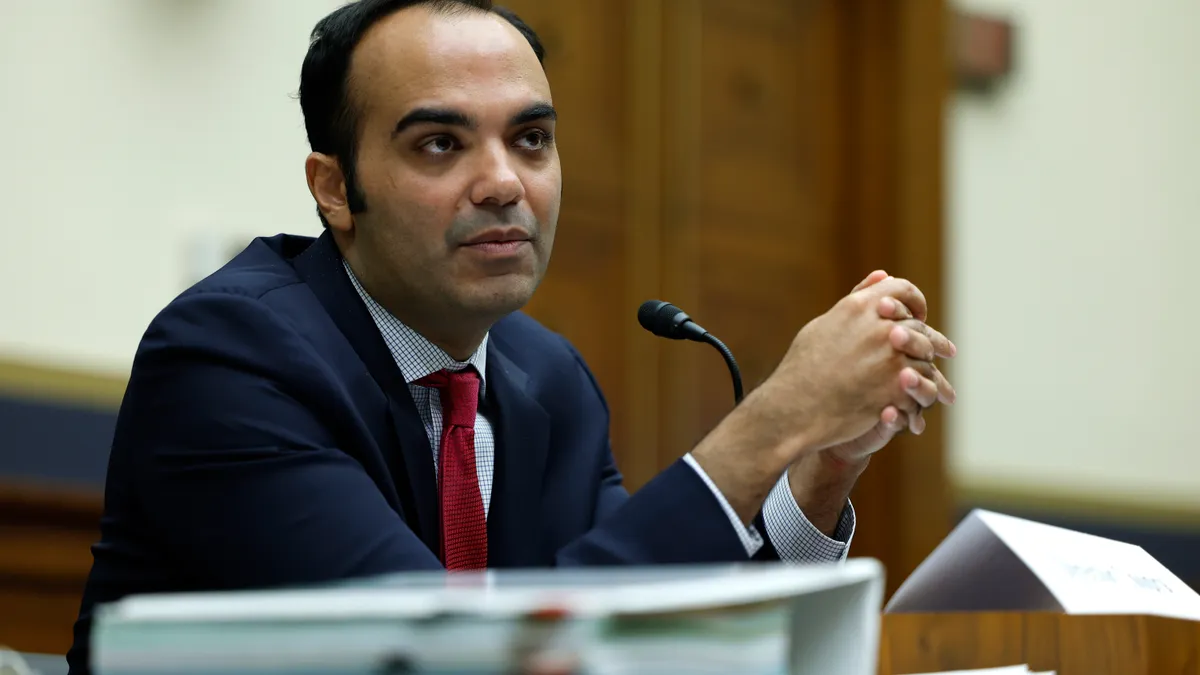Despite changes implemented by banks and credit unions aimed at helping customers avoid overdraft fees, many Americans are still surprised when they are charged for overdrawing their bank accounts, according to a recent survey conducted by the Consumer Financial Protection Bureau.
Only 22% of households that were charged an overdraft fee or nonsufficient fund fee within the past year expected their most recent overdraft, the consumer watchdog said in its report Tuesday.
Among consumers in households charged an overdraft fee in the past year, 43% were surprised by their most recent overdraft and 35% thought it was possible, the bureau found.
“Our research finds that American families are paying fees they do not expect, even when they have access to cheaper forms of credit,” CFPB Director Rohit Chopra said in a statement.
According to the survey, among households charged one to three overdraft fees in the past year, 68% had credit available on a credit card, while 62% of households charged three to 10 overdraft fees had credit available on a credit card.
In households charged more than 10 fees in the past year, 51% had credit available on a credit card, the CFPB found.
The survey also found overlap among consumers charged overdraft and NSF fees.
“Among consumers in households charged an NSF fee in the past year, 85% were also charged an overdraft fee,” the CFPB said. “Among consumers in households charged an overdraft fee in the past year, 72% were also charged an NSF fee.”
Low-income households are also more likely to be charged overdraft fees, the survey found.
Just 10% of households with more than $175,000 in income were charged an overdraft or an NSF fee in the previous year, compared with 34% of households making less than $65,000, according to the survey.
The CFPB report comes as the agency, backed by the Biden administration, continues its crackdown on “junk fees” it says the banking, airline and hotel industries charge.
Amid growing pressure from lawmakers and the CFPB, banks have been revamping their overdraft policies over the past several years.
The nation’s largest banks and regional institutions have launched products and services that allow customers to avoid overdraft fees, through notifications, grace periods or even emergency lines of credit.
Those efforts have eliminated billions of dollars in fees charged each year, the CFPB noted in its report Tuesday.
Bank trade groups, however, say consumers still want the option to overdraft to cover critical financial needs, such as buying gas, groceries or paying a mortgage.
American Bankers Association CEO Rob Nichols on Tuesday accused the CFPB of “demonizing a financial product consumers clearly appreciate.”
“The CFPB’s latest misleading press release on its own overdraft survey ignores the fact that overdraft protection fees are clearly disclosed, highly regulated, and provide a service that an overwhelming majority of consumers find valuable,” he said. “A more comprehensive survey would have asked consumers if they appreciate their bank's overdraft protection.”
A recent survey the trade group conducted with Morning Consult shows consumers want the ability to overdraft, Nichols argued.
“For the fourth year in a row, 9 in 10 consumers (88%) found their bank’s overdraft protection valuable, and nearly 8 in 10 consumers (77%) who paid an overdraft fee in the past year were glad their bank covered their overdraft payment, rather than returning or declining payment,” he said. “Sixty-three percent of consumers think it’s reasonable for banks to charge a fee for an overdraft, as opposed to only 24% who think it’s unreasonable.”
Consumer Bankers Association CEO Lindsey Johnson said the research was incomplete, as it only surveyed consumers with credit histories.
“The CFPB’s press team cut important corners today, because they rely on a study that is limited to consumers with credit histories,” she said in a statement Tuesday. “That means that as many as 10 percent — or 26 million — of Americans who are ‘credit invisible’ are excluded from its analysis. In doing so, the Bureau continues to overlook consumers on the margins that may benefit most from overdraft services due to their not having access to other well-regulated credit products like credit cards.”
Overdraft services are often a “safety net” for consumers who lack access to traditional credit products, Johnson added.
Without the option to overdraft, many consumers would turn to less-regulated sectors such as payday loans, pawn shops or auto title loans, she said.
Meanwhile, the CFPB is reportedly planning to unveil overdraft regulations by the end of the year, according to Bloomberg Law, which cited people familiar with the discussions.














